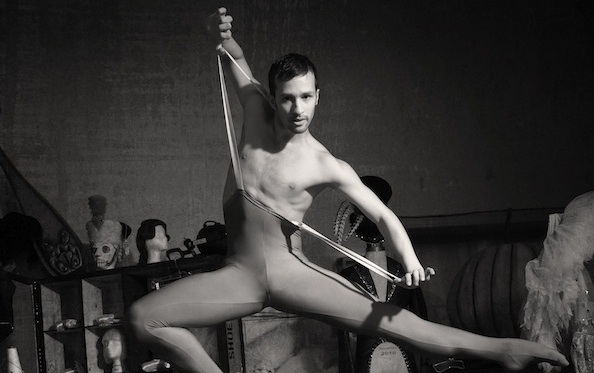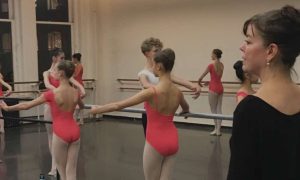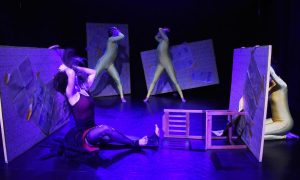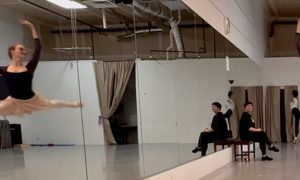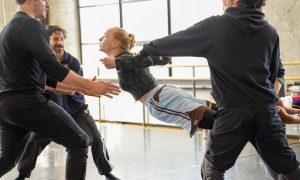By Chelsea Thomas of Dance Informa.
After graduating from the Jacqueline Kennedy Onassis School at American Ballet Theatre in 2005, Boston native Anthony Pina danced for six seasons with the Alberta Ballet in Canada. Now he is dancing with Compañia Nacional de Danza in Spain, a 43-member dance company directed by José Carlos Martínez.
Here in a conversation with Dance Informa, Pina reflects on his career thus far, shares what it was like being named a Principal Dancer in a major European company and divulges what his dreams are that he has yet to accomplish.
Anthony, how did your passion for dance start?
“I started dancing when I was eight years old in The Boston Ballet School. At the time, I had already been training to be a gymnast for a few years, and I remember feeling like there was so much more to ballet. The music, the costumes, the scenery and lights were so exciting to me. I felt almost instantly like this was the world I belonged in.”
As you kept dancing, when did you have your “a-ha” moment that this was something you really wanted to do?
“When I was younger I struggled lot with maintaining my passion for dance. I had a constant need to always be the best and never feeling like I was. I felt like if I was not the best, then I was wasting my time. When I was accepted to the Jacqueline Kennedy Onassis School at American Ballet Theatre, I really started to have a more realistic idea of what I was capable of, and from there I knew that this was what I had to do.”
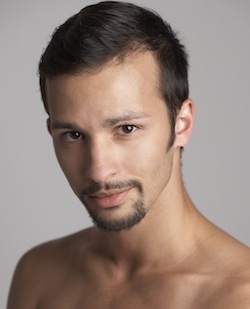
Anthony Pina. Photo by Charles Hope.
Did you come from a family that supported your dreams of becoming a dancer?
“My family has always supported me in every way possible. My mom always told me I can do anything I want as long as I work hard enough, and to this day I still use those words in every aspect of my life. I don’t come from a very wealthy family, so for them to sacrifice as much as they did for me to be able to pursue my dream, I am forever grateful.”
If you could go back and give your 18-year-old self one piece of advice, what would it be?
“If I could go back to my 18-year-old self and give one piece of advice it would have to be to take responsibility for your own mistakes. I was a very defensive teenager who always had some excuse as to why I did things a certain way, especially when I didn’t understand something. At one point in my early twenties, I figured out that I was wasting so much time living like that. I learned to stop making excuses when I didn’t understand and start asking questions. Suddenly, I started understanding and improving at a much faster rate than before.”
After graduating from Walnut Hill School for the Arts, what led you to the Jacqueline Kennedy Onassis School at American Ballet Theatre?
“I was a student and a National Training Scholar at the ABT Summer Intensive Programs, and was on my way to attend SUNY Purchase after graduating high school. While at the summer program, I was taught by Franco De Vita and really enjoyed his way of working. When I found out he would be the new artistic director of the JKO School, I asked to be considered to attend for the year. He chose very few of us from the Summer Intensive, and when I found out I had been accepted, I knew it was the best path for my career.”
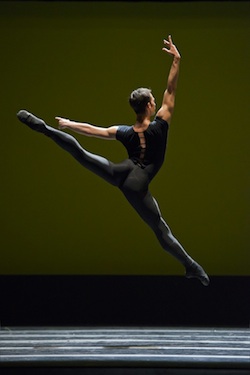
Anthony Pina in ‘Herman Schmerman.’ Photo by Jesús Vallinas.
You spent six seasons dancing with Canada’s Alberta Ballet. During this time, what were some of the highlights?
“One of my most memorable highlights dancing with Alberta Ballet has to be dancing the role of Puck in A Midsummer Night’s Dream by Christopher Wheeldon. It was my third season with the company. I was very young at the time, maybe 20 or 21 years old, and it is an incredibly demanding role. I think to this day, it is still one of the most challenging roles I have danced both physically and mentally. To top it all off, my parents had flown in from Boston for the premiere, and I was sick with the flu! That was not going to stop me, I had invested so much into the character there was no way I was not going on that stage.
I have to say I also have very fond memories of developing a very strong bond with my director at the time, Jean Grand-Maître. He helped me grow in so many ways as an artist and really knew when to push me more than I thought I could be pushed. He taught me that complacency should never be accepted, that we should always want more out of life, that we should always want to better ourselves.”
Coming from Boston originally, what led you to dance in Spain at Compañia Nacional de Danza?
“I always knew I wanted to dance abroad. I felt like home would always be there, but to have an opportunity to live and work in Europe is hard to come by. I had always heard good things about the company and when I found out José Carlos Martinez was taking over direction of the company I thought this was the right moment to try to get in. When a new director takes over a company, I feel like the first round of dancers they hire have a special place in their heart. I am honored to feel like ‘his’ dancer, and to feel like we started on something new together at the same time.”
Since joining the company, what has your daily schedule looked like? How much time do you spend training, performing and touring?
“A dancer’s life is always a bit hectic. I like to be in the studio about 45 minutes to an hour before class. I need time to gather my thoughts and warm-up. I find on the day I arrive late I have a harder time concentrating in class. Class starts at 10 a.m. and we work straight through until 4:30 p.m. with no real lunch break, but instead two 15 minute breaks.
Most days I bring my dog Charlie to work with me. He is trained to stay in his travel bag, which I call his ‘apartment.’ Then in the evenings I moonlight as a costume/clothing designer, so most days I rush home and get to work sewing on whatever my current project is.
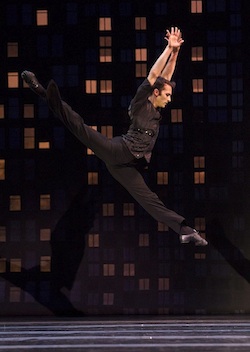
Anthony Pina in George Balanchine’s ‘Who Cares?’ Photo by Alberto Rodrigalvarez.
When we are in the theater performing, the whole day is shifted. We warm-up for the shows around 4:30 p.m. and work until the show is over around 11 p.m. Most of our performances are on tour because we are not part of one steady theater in Madrid. We have traveled to quite a few countries in Europe and in the next few months I am excited to say we will be traveling to China and Japan!”
Congratulations on being promoted to a Principal Dancer last year! How did you find out about the promotion?
“My promotion story is quite funny actually. In order for anyone to move up within our company they are required to audition just like everyone from the outside. I was in the corps de ballet and was auditioning for one of the new soloists contracts. I remember being so nervous. I passed the class, and was asked to perform a variation. After it was all done, we had to wait for three hours before they posted the list.
When it finally went up, I was walking slowly to see and was stopped by our company manager. He told me to look at the list, but the director wanted to speak with me. My immediate thought was that I must have just missed the cut and was being waitlisted, but to my surprise my name was first! Then the panic set in… Why did Jose need to speak to me?
As I was waiting outside his office, a thousand scenarios about what could be wrong passed through my mind. Finally I was called in and Jose began by saying, ‘Congratulations on being promoted, but we have a small problem with your soloist contract…’ I thought maybe there was a problem with my work Visa, or maybe they needed to promote the Spanish dancers who are from this country before foreigners. Then he continued, ‘The problem is we actually need you to renounce your soloist contract… because we would like to give you a principal one instead.’
It was one of the happiest moments of my life; I actually started crying! I never thought after one year in a new company that something like this could happen!”
What are some of the blessings of reaching “Principal” status?
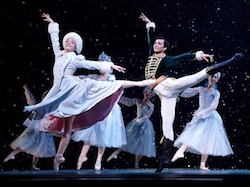
Anthony Pina in ‘The Nutcracker.’ Photo by Charles Hope.
“One of the biggest blessings about being a Principal for me is that I almost always have my rehearsals one on one. In this more intimate setting, I am able to really immerse myself in whatever it is I am dancing. I like working with the staff and having the time to really discuss the work and how to improve it.”
Dancing abroad certainly has its benefits, but it also can be hard. Do you ever feel homesick?
“Over the years, living abroad has become more difficult. When I first moved to Canada, I was 18 years old and had been living away from home since I was 14 years old. I was so excited to be in a new foreign place.
Moving to Spain was a huge leap into a new culture and language and it has been so much fun. That being said, as I get older I am starting to feel like I am missing out on a lot at home. Many of my friends are starting to get married and have children, and it is almost impossible to make it home to be able to share these huge events with them. This coming May 2015 is actually my 10-year high school reunion, and I am almost certain I will not be able to attend. I also come from a huge family, so to try and squeeze in quality time with everyone in the one month I have off a year is quite difficult.”
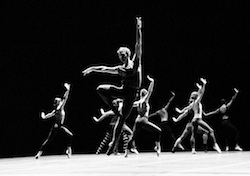
Anthony Pina performing ‘In The Middle Somewhat Elevated.’ Photo by Alvaro Madrigal Arenilla.
Looking to the future, what are some dreams you have yet to achieve?
“I normally don’t like to look too far into the future because I realize there is so much I still want to do with my life! I know at some point I would love to work somewhere closer to home. I have never worked in the U.S. and would love to be able to have the opportunity to do so one day.
I would love an opportunity to work with Christopher Wheeldon. When we performed A Midsummer Night’s Dream he was so busy he couldn’t make it to work with us. He is such an inspiration to me and I love all of his work. I would love to learn from him.
Those who know me well know that I have a huge passion for fashion and sewing. Lately, I have been working a lot more on costumes for our company and some conservatories around Madrid, but I hope to someday have my own womens wear clothing line.”
Lastly, if you could offer advice to ballet dancers hoping to “make it big” one day, what would you say?
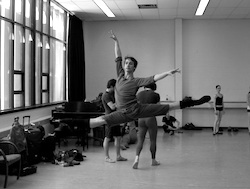
Anthony Pina in the studio. Photo by Sébastien Riou.
“For those young dancers looking to ‘make it big’ I have to say just keep pushing. Even if you are the last cast to learn something, never give up. Never sit down and think, ‘Oh, the staff is not even watching me…’ I will tell you now they are always watching you! Take your space in the back corner and prove to them that you deserve to be given a chance. I spent a lot of time in my career doing this, and still have to even to this day.
Also, you don’t need to compete with anyone. Instead, work for yourself. Work to be the best dancer you can be.
Lastly, ask questions, whether it is about spacing, style, technique or anything. Show your teachers that you are there, you are focused and that you want to know everything they can teach you.”
Photo (top): Anthony Pina. Photo by Charles Hope.


